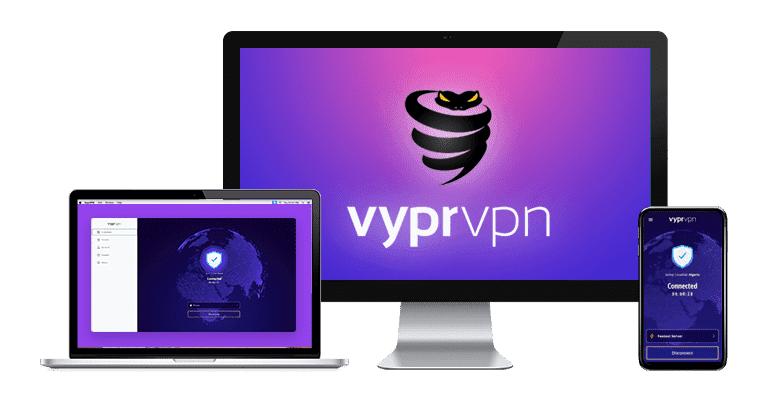Does WhatsApp Work in China? Here’s a Fix + 3 Alternatives
WhatsApp is blocked by the Great Firewall of China due to government restrictions on communication apps. If you’re traveling to the country, you can’t use WhatsApp (and many other messaging apps) to keep in touch with your family and friends back home.
If you want to stay connected in China, I’ve found 2 possible solutions to overcome WhatsApp not working in China. The first and easiest method is to use a VPN. However, remember that non-government-approved VPNs are technically illegal in China and I don’t condone breaking any laws.
The second method is to use an alternative messaging app that works in China. It’s more tedious as you’ll have to download another app and possibly import your contact list. But it’s less risky if you’re worried about using a banned VPN. I provide more information on both methods in this article, but I advise you to choose with caution.
Important! WhatsApp, along with many other similar services are blocked in China, including non-government-approved VPNs. That being said, there have been no instances of a tourist being penalized for using either service while there. But please practice caution and inform yourself of the most recent local laws.
Quick Guide: How to Use WhatsApp in China — 3 Easy Steps
- Get a VPN. Make sure to sign up for a VPN that works in China. I recommend ExpressVPN. Most VPN websites are blocked in the country, so install the app before arriving in China.
- Connect to a VPN server. Pick the nearest location outside Mainland China, like Hong Kong or South Korea, to get the best connection speeds.
- Use WhatsApp in China. Your device is now secure and you should be able to talk to all your contacts on WhatsApp without issues.
WhatsApp Is Not Working in China: Quick Fixes
Without help, WhatsApp won’t work in China because the country’s government blocks many online services since they aren’t able to monitor communications on them. The only way to get it to work is to use a VPN. Otherwise, you have to use another messaging app that’s not blocked in China.
However, note that the Chinese government also blocks VPN sites and IP addresses, so most VPNs don’t work there. But if you have a VPN that’s proven to work in China, try these fixes as even the best service can sometimes run into issues:
- Check all security options are configured correctly — turn on obfuscation (aka. stealth), kill switch, and data leak protection to make sure your traffic is routed through the encrypted tunnel as regular traffic.
- Reconnect to a different server — changing servers can help if the one you’re connected to is under maintenance or blocked by China’s firewall.
- Try a different VPN protocol — if your VPN has multiple protocols, try switching as others may work more effectively. However, some like PrivateVPN, only have 1 protocol available for China.
- Port forward to port 433 — routing your traffic to this port can sometimes help as it’s commonly used for encrypted communication. Some VPNs allow you to choose ports under settings.
- Contact customer service by email — the support teams can sometimes suggest better servers and other settings to try, so it’s worth getting in touch with them.
If these fixes don’t work, use an alternative messaging app in China. Unfortunately, most popular messaging apps don’t provide adequate privacy in a country that already eavesdrops on all online activities. Since most of the apps that are allowed in China are heavily monitored, a VPN is still useful if you’re concerned about your privacy. Try any of these alternative messaging apps that work in China below.
Best Messaging Apps That Work in China in 2024
1. Threema
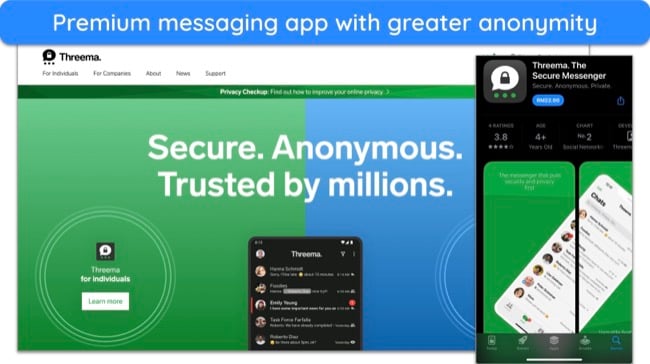
| Pros Not blocked in China Doesn’t require phone or email for registration Encrypts messages using 256-bit cipher Located in Switzerland, where there are no data retention laws |
Cons Premium service requires subscription Small user base |
Threema is one of the most private and secure WhatsApp alternatives that hasn’t been blocked in China. The moment Threema messages are dispatched, they are promptly erased to eradicate any potential for unauthorized listening, data breaches, or disclosures. It also has an option to password-protect and hide confidential messages.
You don’t have to provide an email address or mobile number to get started with Threema. Instead, the app generates an 8-digit ID that becomes a private encryption key, which is stored in your device. It then creates a public key pair and distributes it to your chat friends to secure your communication in China.
Beyond standard messaging, group chats, media sharing, voice and video calling, Threema has some nice extras. I found out that you can use Threema to create polls, pin messages for easy access later, and quote previous messages in replies.
2. Skype

| Pros Free app Send messages and make calls |
Cons Not encrypted Connections aren’t always stable |
Skype is a popular communication app worldwide, and it’s available to use in China for sending messages and making voice and video calls. Given its popularity and ease of use, you’ll likely find many of your contacts already use the service — so you don’t have to worry about adding everyone to a new app.
In most countries, Skype has end-to-end encryption to protect your messages, but not in China. In order to operate in China, Skype has removed encryption to allow monitoring of communications, meaning your conversations and calls won’t be private. You’ll find there’s also a chat filter that censors certain words and topics that are banned in China.
However, the biggest issue you’ll face is connection stability. While the majority of users report relatively stable connections, many have said that it’s typical for Skype connections to fail, especially when video or voice calling. It’s quick and easy to reconnect, but it’s annoying — fortunately, Skype’s messaging doesn’t seem to be affected by delays or interruptions.
3. WeChat
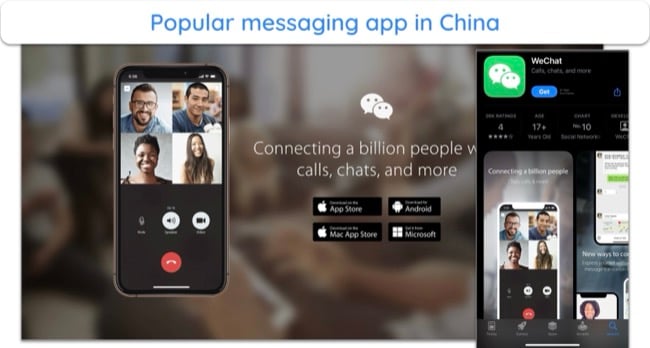
| Pros Most popular messaging app in China Free to use Built-in QR code scanner Built-in electronic wallet linked to Chinese bank accounts |
Cons Continuously monitored — no end-to-end encryption Shares data with third parties Logs social media profile visits |
WeChat is China’s most popular messaging app for iOS, Android, macOS, and Windows. It’s free to use and approved by the Chinese government. Besides messaging, WeChat has a scanner to read QR codes that are widely used in China. If you need to get information about a service, make payments, or add a friend to WeChat, just scan their codes.
Unfortunately, WeChat is continuously monitored in China. The platform exercises strict surveillance over pictures, comments, and videos, implementing rigorous censorship measures. Critical opinions run the risk of being swiftly removed from the platform without prior notice.
It also logs the social media profiles you visit, who you communicate with on the app, and your IP address, among other things. There are even documented cases of the Chinese Government arresting people for things they posted or said on the app.
While WeChat primarily censors users who have Chinese phone numbers, as a foreign user, your activities on the platform are subject to monitoring. This is possible because there’s no end-to-end encryption.
Best VPNs for WhatsApp in China in 2024
1. ExpressVPN — The Most Reliable and Secure VPN for WhatsApp in China
Key Features:
- 3,000+ servers in 105 countries including locations near China like Hong Kong, Japan, Taiwan, India, Vietnam, and more
- Military-grade 256-bit encryption, obfuscated servers, an automatic kill switch, leak protection, and TrustedServer technology to keep your communications private
- Connect up to 8 devices at the same time
- 24/7 live chat support, a knowledge base, and video guides
- 30-day money-back guarantee on all plans
ExpressVPN has the most secure protocols and the best obfuscation feature. This advanced firewall-breaking tech is what makes it work reliably in China, when so many VPNs don’t. Its proprietary Lightway protocol was designed to support obfuscation with much faster speeds and less configuration compared to what other VPNs with this function tend to offer. Additionally, ExpressVPN uses:
- RAM-based servers — prevent your communications from ever being stored since they’re not capable of retaining data after scheduled reboots.
- Network Lock — stops the internet temporarily if your device loses connection to the VPN to prevent any data exposure.
- Leak protection — ensures your traffic stays within the encrypted tunnel as long as you’re connected to ExpressVPN.
- Proven no-log policy — proven during independent audits and in a real life case that ExpressVPN doesn’t store any identifiable data. When the Turkish authorities seized one of its servers to aid a criminal investigation, they found no helpful data.
During tests, I was surprised by how fast ExpressVPN’s servers were. The additional step of hiding the tell-tale signs of a VPN protocol in the data packets usually takes a while. However, ExpressVPN’s Lightway protocol also ensured my connections were fast — I only saw a 14% drop from my baseline speeds, even with servers 5,000 miles away.
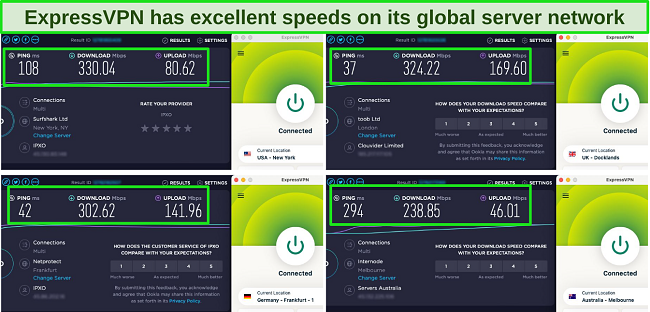
However, you won’t have to make long-distance connections since ExpressVPN has many servers within 3,000 miles of China. Some of the nearby servers include Hong Kong, South Korea, Taiwan, Vietnam, and India. You can connect to any of these to use WhatsApp, Telegram, and other instant messaging apps without lags in China.
I also like that ExpressVPN comes pre-configured for China. You can connect to any server as usual and it’ll work with your regular online services (including WhatsApp). With other VPNs, you may have to turn on the obfuscation feature or change certain settings for it to work in the country.
Being the best VPN for China, expect to pay slightly more to use ExpressVPN. Its most affordable 1-year + 3 months plan costs $6.67 a month, which is a bit expensive. However, ExpressVPN delivers on its promise to work consistently in China while providing the best speeds and security.
All its plans are backed by a 30-day money-back guarantee. If you aren’t satisfied with ExpressVPN after purchasing, just request a full refund. When I contacted support via 24/7 live chat, my request was approved in 1 minute and the money was back in my account within 5 days.
ExpressVPN works on: Windows, macOS, Linux, Chromebook, Android, iOS, Chrome, Firefox, Edge, PlayStation, Xbox, Nintendo Switch, Amazon Fire TV, Amazon Fire TV Stick, Nvidia Shield, Xiaomi Mi Box, Chromecast, Roku, Android TVs, smart TVs, routers, and more.
2024 Update! ExpressVPN has dropped prices for a limited time to a crazy $6.67 per month for the 1-year plan + 3 months free (you can save up to 49%)! This is a limited offer so be sure to grab it now before it's gone. See more information on this offer here.
2. PrivateVPN — Stealth Mode Prevents VPN Traffic Detection for Private Communication in China
Key Features:
- 200+ servers in 63 countries including Taiwan, Japan, and Hong Kong
- Military-grade 256-bit encryption, Stealth Mode, a no-log policy, and a kill switch
- Chat on up to 10 devices simultaneously in China
- Get help via 24/7 live chat, email, or online guides
- Easy-to-redeem 30-day money-back guarantee
PrivateVPN has a stealth mode that you can switch on in China to use WhatsApp or any service that’s blocked there. It’s PrivateVPN’s obfuscation feature to hide its traffic from China’s firewall. My team of testers in China confirmed that the Stealth VPN camouflaged their traffic and worked 10 out of 10 times during tests. They also found it extremely easy to use.
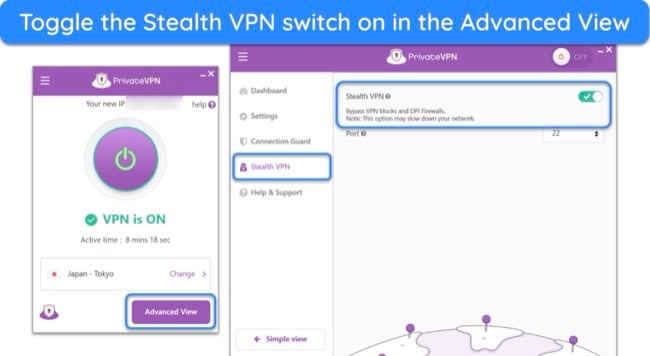
Besides Stealth VPN, PrivateVPN protects your security and privacy in China with these features:
- Flexible encryption — gives you the freedom to switch from the more secure 256-bit encryption to 128-bit if you’re more concerned about speeds for your online activities.
- Perfect Forward Secrecy — changes your encryption key after every session to minimize the risk to your data if it’s hacked, though unlikely.
- Automatic kill switch — prevents data loss during VPN connection interruptions by disabling the internet
- Application Guard for Windows — closes pre-selected apps like WhatsApp automatically if your VPN connection is interrupted.
Due to PrivateVPN’s smaller network of 200 servers, I expected some overcrowding among those nearby China. However, the servers in Hong Kong, South Korea, and Vietnam were fast even with 256-bit encryption. PrivateVPN’s Stealth VPN reduced my baseline speeds further, but at 67 Mbps, it was still fast enough to send photos and videos instantly on WhatsApp.
As with all VPNs, PrivateVPN’s website is blocked in China. I recommend downloading the apps before arriving in the country and turning on Stealth Mode immediately after. If you need help, PrivateVPN’s support team can install the apps remotely on your Windows, macOS and Linux devices.
The only problem with PrivateVPN is that it doesn’t provide WebRTC leak protection. This is important if you use WhatsApp on Firefox or Chrome as it may expose your real IP address while messaging or video calling. If you often use web-based instant messaging, check out PrivateVPN’s guide on its support site to prevent WebRTC leaks before leaving for China.
If you’re looking for an affordable short-term plan, PrivateVPN ranks among the best monthly VPNs. But I recommend the 3-year plan for $2.00 a month. All plans include a 30-day money-back guarantee so there’s enough time to try it in China. I sent an email asking for a refund and received a reply the same day. I was reimbursed within a week.
PrivateVPN works on: Windows, macOS, Linux, Android, iOS, Raspberry Pi, Chrome, Firefox, PlayStation, Xbox, Nintendo Switch, Amazon Fire TV, Amazon Fire TV Stick, Roku, smart TVs, routers, and more.
3. VyprVPN — Chameleon Protocol Avoids Deep Packet Inspection in China to Use WhatsApp Privately
Key Features:
- 700+ servers in 63 countries including Taiwan, Japan, and Hong Kong
- Military-grade 256-bit encryption, a location in privacy-friendly Switzerland, and a kill switch to ensure your data stays hidden on chat apps
- Connect and chat on 10 devices at once in China
- 24/7 live chat and email support plus FAQs, community forums, and setup guides
- 30-day money-back guarantee
VyprVPN has a proprietary Chameleon protocol to avoid China’s deep packet inspection (DPI). DPI is one of the main methods used by Chinese firewalls to identify and stop VPN traffic. Chameleon also uses Smart IP technologies to constantly change your IP address to prevent eavesdroppers from tracking your WhatsApp messaging activities in China.
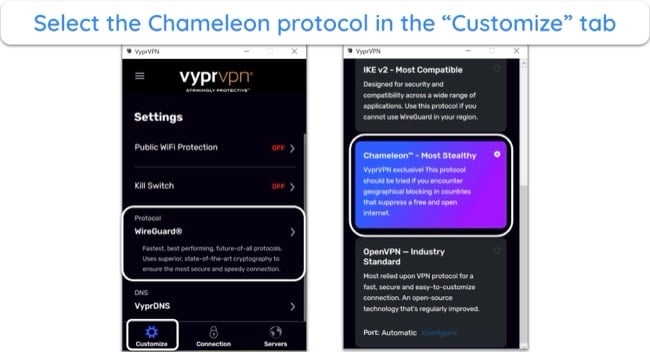
Additionally, VyprVPN has:
- Privately-owned servers — prevent third-party data center operators from snooping on your data.
- Split tunneling — allows you to route your WhatsApp traffic through the encrypted tunnel while excluding other apps.
- Privacy-friendly location — based in privacy-friendly Switzerland, so it has no obligation to log your data or share it with any foreign governments.
Among the VPNs on this list, VyprVPN was the slowest with its Chameleon protocol. However, every server I connected to was fast enough for video and voice chats on WhatsApp — I averaged around 65 Mbps with the servers in Hong Kong, Macau, and Vietnam. This helped me get clear audio and sharp visuals during my calls.
One big advantage to using VyprVPN is that you don’t necessarily have to download the apps before you arrive in China. The main website is still blocked in the country, but VyprVPN has a mirror site that works great. It also has a dedicated support page called ‘Tips for Accessing our Website & Apps from China’ — read it before leaving to be more prepared.
The only minor thing to remember is that VyprVPN isn’t pre-configured for China. With PrivateVPN, you only need to switch on stealth mode. But with VyprVPN, you’ll have to switch to Chameleon protocol and turn on the kill switch. Still, it’s not a major issue since they only take 3 seconds. Plus, VyprVPN works reliably in China once you take care of these.
If you want to try VyprVPN, I recommend the 2-year plan for $3.00 a month. This is ideal if you change your mind and wish to change to a different VPN — you can ask for a refund within 30 days of purchasing. I tested the policy by sending a message via 24/7 live chat and got my money back in a week.
VyprVPN works on: Windows, macOS, Linux, Android, iOS, Chrome, Firefox, Opera, PlayStation 4, Xbox One, Amazon Fire TV devices, Chromecast, Apple TV, Roku, smart TVs, routers, and more.
How to Choose the Best VPN for WhatsApp in China
My team and I tested some of the top VPNs in 2024 against these criteria to find the best one for using messaging apps in China.
- Works with WhatsApp on restrictive networks — I made sure to select only VPNs with strong obfuscation features to make sure it works in China to access apps like WhatsApp, Telegram, or Signal.
- Premium security features — Besides obfuscation, these VPNs also have data leak protection and a kill switch to always keep your data private in China.
- Zero-logs privacy — ExpressVPN has an audited no-log policy and RAM-based servers, while VyprVPN’s privacy policy has been audited by Leviathan Group.
- Nearby servers for fast connection speeds — All the VPNs on this list have servers in China’s neighboring countries like Hong Kong and South Korea, and they’re all fast.
- Compatible with multiple devices — Whether you use a mobile device, desktop, or web browser, the VPNs on this list can help you use WhatsApp safely.
- Accessible customer service — The VPNs on this list have a responsive and knowledgeable support team that responds within a day via email.
The Best Way to Configure Your VPN and Improve Anonymity
Some VPNs like ExpressVPN don’t require you to do anything other than connect to a server for it to work flawlessly, whether you’re in China or anywhere else. Others like PrivateVPN only require you to activate the Stealth Mode. If you’re not sure if your VPN has optimized settings for China, check these before connecting.
- Turn on the kill switch if it’s not on by default.
- Check if the leak protection is on. If not, switch on DNS, IPv6, and WebRTC leak protection.
- Turn on obfuscation (aka Stealth) if it’s a separate feature.
- Use the recommended protocol for China. You can find this out by speaking to your VPN’s support team or visiting its website.
There are also other steps you can take to remain anonymous:
- Create a different WhatsApp account and profile if you don’t want to be identified.
- Browse carefully online. Avoid visiting websites and social media sites that can give away your identity.
FAQs: Using WhatsApp in China With a VPN
Is it legal to use WhatsApp in China with a VPN?
No. WhatsApp and most major VPNs are banned in China, so you may face legal issues for using them. The VPNs for WhatsApp in China recommended on this list are not approved by the Chinese government. Those that are approved are monitored heavily by the government and log data, which goes against the privacy policies of many major VPNs.
That being said, there have never been any reports of tourists being punished for using VPNs to use their regular apps and services when visiting China. The Wizcase team highly encourages you to do your research and proceed with caution.
Can I use a free VPN to access WhatsApp?
Is WhatsApp secure and private?
What other apps and websites are blocked in China?
China blocks many websites and apps, and new sites are being restricted every day. These are a few that you can’t access without a secure and private VPN:
- Streaming sites — YouTube, Twitch, Vimeo, Hulu, HBO, Vevo, Dailymotion, Spotify, and more. Some sites, like Netflix and Disney+, aren’t blocked but won’t display any content when you log in as they are unavailable to locals.
- Social networks and messaging apps — Facebook, Reddit, Instagram, Snapchat, WhatsApp, Twitter, Tinder, LinkedIn, Tumblr, and Pinterest are all blocked in China.
- Search engines — Google, Yahoo, and DuckDuckGO are unavailable in China.
- VPN, proxy, and other restriction-bypassing sites — ExpressVPN, PrivateVPN, VyprVPN, DNS proxies, and other sites and apps that circumnavigate online restrictions are all blocked.
- File-sharing sites — Imgur, Dropbox, Google Drive, and all torrent sites are blocked.
- News and information sites — The New York Times, Washington Post, BBC, WordPress, The Guardian, Wikipedia, and more are inaccessible in China.
Note that while it’s possible to access these sites in China with a VPN, my team and I don’t condone bypassing local laws or accessing restricted services. It is up to you to use a VPN responsibly, where it’s permitted.
The Bottom Line
WhatsApp and non-government-approved VPNs are blocked in China, so you’ll have some trouble keeping in touch with your loved ones from the country. There are a few government-approved messaging apps for China like WeChat, but it’s a hassle transferring your contact details over. Plus, your communication on these apps will be closely monitored.
Although I don’t condone using a blocked service in China, it’s always a good idea to use a VPN to stay safe. If you need a VPN with strong security and privacy features for China, ExpressVPN is the top choice. You can try ExpressVPN with WhatsApp in China, and it’s backed by a 30-day money-back guarantee.



